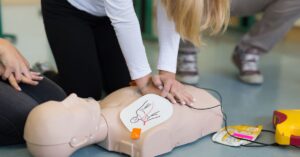When healthcare professionals face life-threatening emergencies, a split-second decision is all it takes to change recovery into tragedy. The Trauma Nursing Core Course (TNCC) helps people learn systematic approaches to handle these critical moments with precision and confidence.
The psychological and physiological responses to extreme stress can impair judgment, slow reaction times, and compromise performance. Managing high-stress situations through key lessons from TNCC provides healthcare workers with evidence-based strategies that prove valuable in emergency rooms and other high-pressure environments.
Building Muscle Memory
High-stress environments often impair higher-level cognitive functions, which is why the TNCC program emphasizes repetitive practice until critical medical procedures become second nature to healthcare professionals.
Simulation exercises recreate the sensory overload and time pressure characteristic of real emergencies, allowing participants to practice essential skills repeatedly under controlled stress situations. This repetitive approach gives participants the confidence to provide exceptional care, even through high-pressure situations.
Effective Communication Under Pressure
Clear communication becomes more challenging when stress levels rise and multiple team members must coordinate complex interventions simultaneously. TNCC teaches specific communication protocols designed to function effectively during these high-intensity situations.
The SBAR framework provides a clear structure for conveying critical information quickly and clearly. This standardized format ensures essential details receive proper attention while minimizing miscommunication risks that could compromise patient outcomes. This simple practice prevents misunderstandings that commonly occur when team members feel rushed or overwhelmed by competing demands.
Decision Making with Incomplete Information
Real emergencies require immediate action, often without time to gather information on the scenario. TNCC prepares healthcare professionals to make sound decisions based on available data while remaining flexible enough to adjust approaches as new information emerges. The program teaches participants to prioritize interventions based on potential impact rather than certainty levels. This approach ensures life-threatening conditions receive immediate attention even when the diagnosis is uncertain.
CPR123 provides a thorough and detailed trauma nurse core course certification designed to prepare you for even the most challenging medical emergencies. This certification equips you with the skills and knowledge needed to stay composed and effective under pressure, ensuring you can provide the best possible care in any situation. Explore our course today!
Transforming Crisis Into Opportunity
Healthcare professionals who master managing high-stress situations by applying key lessons from TNCC often discover that their enhanced skills can extend far beyond emergency scenarios. The confidence, communication skills, and systematic thinking developed through this training create lasting professional advantages that improve performance across all areas of healthcare practice. These skills remain relevant throughout healthcare careers, providing foundations for leadership roles and specialized practice areas where excellence under pressure defines success.







